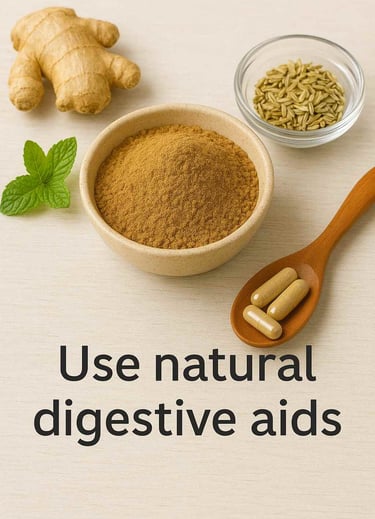DAILY BEST KNOWLEDGE
10 Effective Home Remedies to Improve Gut Health Naturally
Discover 10 effective home remedies to improve gut health naturally. Explore effective home remedies to improve gut health with probiotics, prebiotic foods, hydration, fiber, and simple lifestyle changes that support digestion and overall well-being. Start your journey to a healthier gut today.
HEALTH
Iftikhar Ishaque Memon
9/15/20254 min read


Introduction:
This content highlights simple and natural ways to boost your gut health. It begins by explaining the importance of a healthy gut for digestion and immunity, then introduces the first remedy: incorporating probiotics into your diet to support beneficial gut bacteria. Next, it discusses eating prebiotic-rich foods and staying properly hydrated to aid digestion.
The content continues with advice on increasing your fiber intake and reducing consumption of processed foods and added sugars, both of which are crucial for maintaining a balanced gut flora and reducing inflammation. It also recommends drinking herbal teas and managing stress, emphasizing the gut-brain axis.
Further tips include ensuring enough quality sleep for gut repair and using spices like turmeric and cumin as natural digestive aids. Finally, the content encourages regular exercise as a key lifestyle change to support digestion and overall gut health, stressing the importance of consistency and gradual improvements.
Description:
Fortunately, you can support your gut health with natural, science-backed remedies. This content explores ten effective home remedies to improve your gut health naturally, empowering you to take charge of your well-being with simple, sustainable lifestyle changes.
(1) Incorporate Probiotics into Your Diet
Probiotics are live beneficial bacteria found in fermented foods like yogurt, kefir, sauerkraut, kimchi, and miso. They support
digestion and the immune system. Consume a variety of fermented foods regularly with live and active cultures.
(2) Eat Prebiotic-Rich Foods
Prebiotics are non-digestible fibers found in garlic, onions, leeks, asparagus, bananas, and oats that feed beneficial gut bacteria. Combine prebiotic-rich foods with probiotics for the best results.
(3) Stay Hydrated
Water helps break down food, dissolve nutrients, and move waste through the intestines. Dehydration can cause constipation and disrupt gut bacteria. Drink at least eight 8-ounce glasses of water per day, adjusting for activity and climate.
(4) Increase Fiber Intake
Soluble fiber feeds beneficial bacteria and regulates blood sugar; insoluble fiber adds bulk to stool and promotes regularity.
Gradually increase fiber intake and drink sufficient water to avoid discomfort.
(5) Reduce Processed Foods and Added Sugars
Processed foods and sugars promote harmful bacteria growth and inflammation, increasing risks of obesity and digestive issues. Replace with whole, minimally processed foods like fruits, vegetables, lean proteins, and whole grains.
(6) Drink Herbal Teas
Herbal teas like peppermint, ginger, and chamomile support digestion and reduce nausea, inflammation, and digestive discomfort. Enjoy these teas daily as gentle, natural remedies.
(7) Manage Stress
Stress disrupts gut motility, increases inflammation, and alters the gut microbiome via the gut-brain axis. Practice mindfulness, meditation, yoga, deep breathing, and physical activity to manage stress.
(8) Ensure Quality Sleep
Sleep supports gut repair and microbiome balance; poor sleep increases digestive problems. Aim for 7–9 hours of quality sleep with a consistent schedule and restful environment.
(9) Use Spices and Natural Digestive Aids
Spices like turmeric, cumin, and ginger have anti-inflammatory and digestive benefits. Incorporate these spices into meals for flavor and gut health support.
(10) Exercise Regularly
Moderate exercise stimulates gut motility and supports a healthy microbiome. Aim for at least 150 minutes of moderate exercise per week. By making these small, consistent changes, you can naturally enhance your gut health and experience improved overall wellness.
Conclusion:
Taking care of your gut health is simpler than you might think, and the benefits extend far beyond just digestion. By enjoying more probiotic foods, choosing fiber-rich meals, staying well hydrated, and moving your body regularly, you create a strong foundation for a happy gut. Do not underestimate the power of restful sleep, effective stress relief, and natural spices; they all play important roles in maintaining balance and supporting your digestive system. Remember, small, consistent changes add up over time, leading to better overall health and well-being. Embrace these habits at your own pace, listen to your body, and enjoy the journey toward a healthier, more vibrant you.
Frequently Asked Questions:
How long does it take to notice developments in gut health?
Most people start feeling positive changes within a few weeks of making healthy adjustments, but lasting improvements come with consistent habits over time.
Do I need supplements, or can I get everything from food?
In most cases, a varied diet rich in whole foods provides all the nutrients and beneficial bacteria your gut needs. Supplements can help if you have specific deficiencies, but it is best to consult a healthcare professional first.
Can stress really affect my digestion?
Yes! Stress can disrupt the gut-brain connection, leading to symptoms like bloating, discomfort, or irregular bowel movements. Managing stress is key to a healthy gut.
What are the finest foods to eat for gut health?
Fermented foods (like yogurt, kimchi, and sauerkraut), prebiotic-rich vegetables (such as onions, garlic, and bananas), whole grains, and plenty of fruits and vegetables are all excellent choices.
How much water should I drink for good digestion?
Aim for about 8 glasses (2 liters) of water a day, but your needs may vary depending on your activity level and environment. Listen to your body and drink when you are thirsty.
Is it normal to feel bloated when increasing fiber?
A little bloating is common when you first add more fiber. Increase your intake gradually and drink enough water to help your body adjust.
For information about plant-based Diet, visit https://www.dailybestknowledge.online/top-benefits-of-a-plant-based-diet








© 2025. All rights reserved.
This platform delivers well-researched articles to empower your personal and professional life.


